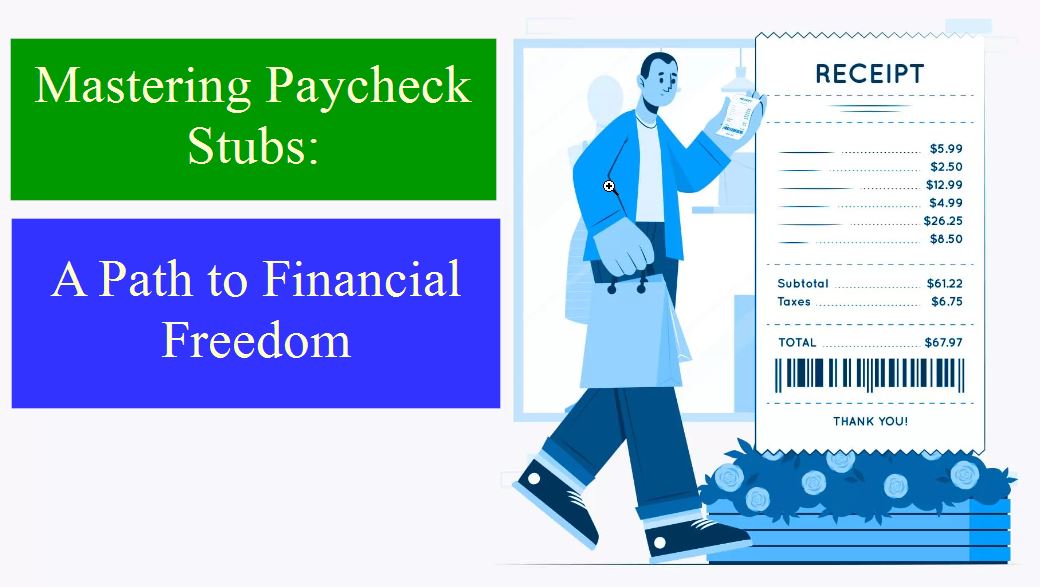In the pursuit of financial freedom, understanding, and mastering paycheck stubs is a crucial step. Your paycheck stub, also known as a paystub or pay slip, provides a detailed breakdown of your earnings and deductions for each pay period. It’s more than just a piece of paper—it’s a valuable tool that can help you take control of your finances, plan for the future, and achieve financial stability.
In this comprehensive guide, we will delve into the world of paycheck stubs, unraveling the mysteries behind the numbers and codes, and showing you how to leverage this information to improve your financial well-being. Whether you’re a seasoned professional or just starting your career, mastering paycheck stubs is a journey worth embarking on.
Decoding the Paycheck Stub
Before you can master your paycheck stub, you need to understand its components.
Here’s a breakdown of the key elements you’ll find on your paystub:
- Gross Earnings: This is your total earnings before any deductions. It includes your hourly or salary rate and the number of hours worked during the pay period.
- Net Pay: Also known as “Take-Home Pay,” this is the amount you receive after all deductions have been subtracted from your gross earnings.
- Taxes: Paycheck stubs show the various taxes withheld from your paycheck, such as federal income tax, state income tax, and local taxes.
- Deductions: These include both voluntary deductions (like retirement contributions or health insurance premiums) and mandatory deductions (such as Social Security and Medicare).
- YTD (Year-to-Date) Totals: This section summarizes your earnings and deductions for the current year, helping you keep track of your financial progress.
Understanding these components is the first step toward financial literacy. When you can decipher your paycheck stub, you’ll have a clearer picture of where your money is going and how much you’re earning.
Budgeting with Paycheck Stubs
Once you’ve decoded your paycheck stub, you can start budgeting effectively. Budgeting is the cornerstone of financial freedom, as it helps you manage your money, save for goals, and avoid debt. Here’s how your paycheck stub can assist in the budgeting process:
- Identify Fixed and Variable Expenses: Your net pay gives you a starting point for budgeting. From there, you can categorize your expenses into fixed (e.g., rent/mortgage, utilities) and variable (e.g., groceries, entertainment) categories.
- Account for Taxes and Deductions: By factoring in the taxes and deductions from your paycheck, you can calculate your disposable income—the money you have left after mandatory expenses.
- Set Financial Goals: With a clear understanding of your income and expenses, you can set realistic financial goals, such as saving for a vacation, paying off debt, or building an emergency fund.
- Track Your Progress: The YTD totals on your paycheck stub provide a snapshot of your financial journey. Regularly reviewing these figures can help you stay on track and make necessary adjustments to your budget.
Maximizing Your Paycheck
Now that you’ve established a budget, it’s time to explore strategies for maximizing your paycheck and increasing your financial freedom:
- Tax Optimization: Consult a tax professional to ensure you’re taking advantage of all available tax deductions and credits. This can result in significant savings over time.
- Salary Negotiation: Don’t settle for a stagnant income. Research industry salary standards and negotiate your salary or seek promotions when appropriate.
- Benefit Utilization: Review your paycheck stub to ensure you’re making the most of your employee benefits, such as retirement contributions, healthcare plans, and flexible spending accounts.
- Side Income: Consider exploring opportunities for additional income through side gigs or investments. Every extra dollar can contribute to your financial freedom.
Planning for Retirement
Achieving financial freedom often involves planning for retirement. Your paycheck stub can play a crucial role in this process:
- 401(k) Contributions: Review your paycheck stub to ensure you’re contributing enough to your employer-sponsored retirement plan, such as a 401(k). Take advantage of employer matching contributions if available.
- IRA Contributions: If you have an Individual Retirement Account (IRA), use your paycheck stub to track your contributions and ensure you’re maximizing your annual limits.
- Investment Options: Consider diversifying your investments and seek professional advice to make informed choices based on your financial goals and risk tolerance.
- Social Security: Keep an eye on the Social Security deductions on your paycheck stub. Understanding how this program works and when you’re eligible for benefits is essential for retirement planning.
Staying Informed and Adapting
The financial landscape is constantly changing, and it’s essential to stay informed and adaptable. Your paycheck stub is a tool that can help you navigate these changes:
- Regular Check-ins: Make it a habit to review your paycheck stub regularly, ensuring that all the information is accurate.
- Emergency Fund: Use your paycheck stub to calculate your monthly expenses and set aside money for an emergency fund. This fund can provide a financial safety net in times of unexpected expenses.
- Financial Education: Continue to educate yourself about personal finance. Attend workshops, read books, and seek advice from financial experts to refine your financial literacy.
Conclusion
Mastering paycheck stubs is a path to financial freedom that empowers you to take control of your financial future. By understanding the components of your paycheck, budgeting effectively, and making strategic financial decisions, you can pave the way for a more secure and prosperous future. Your paycheck stub is not just a record of your earnings; it’s a roadmap to financial freedom that you can use to build the life you desire. Start your journey today and unlock the full potential of your paycheck stub.
